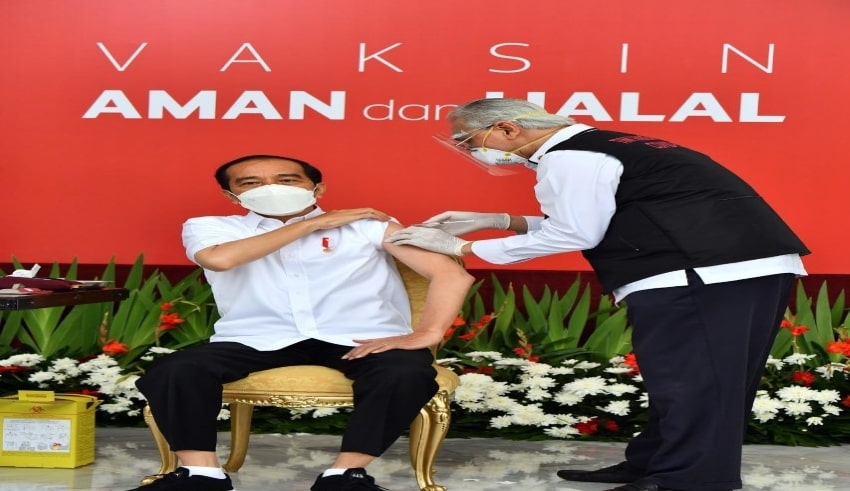
Secure and halal, as Indonesian President Joko Widodo relaxed into a chair in front of it and rolled up his sleeve to collect his first injection of Covid-19 vaccine, the words shouted from a red background. The cameras rolled live and soon enough, on social media and news blogs, images and videos of the famous moment started making the rounds.
Saya telah menerima suntikan vaksin Sinovac. Evaluasi BPOM, efikasinya 65,3 %, di atas standar WHO yang 50 %. MUI juga menyatakan vaksin Sinovac halal.
— Joko Widodo (@jokowi) January 13, 2021
Saya telah memerintahkan agar vaksinasi Covid-19 segera dilaksanakan di seluruh Tanah Air.https://t.co/keTczZS2NR
In the most populous Muslim-majority country in the world with 270 million inhabitants, the message was most likely intended to ease nerves, with many wondering whether the vaccine was safe to use and legal under Islam.
The vaccine developed by the Chinese drugmaker Sinovac Biotech seems to be the safest bet to keep the health problem under check, with almost a million cases and 27,000 deaths – and counting. And even though BPOM, the food and drug monitoring agency of the world, valued the effectiveness of the vaccine at just 65.3 percent, the government is wasting no effort to persuade Indonesians to get vaccinated. Following his example, Mr Joko led, becoming the first to be inoculated.
In fact, A religious edict deeming the vaccine as halal, or lawful, was also provided by the Indonesian Ulema Council, the highest Muslim clerical body. Ministers, priests, actors and even a vegetable vendor were roped in for the promotional campaign at the start of the mass vaccination program on Jan 13.
For this reason, the government has set an ambitious goal of vaccinating 181.5 million citizens, or nearly 70% of the population, in 15 months or by March 2022 to achieve herd immunity. However, several medical professionals raised concerns about the timetable.
Pada kartu vaksinasi Covid-19 atas nama saya ini tercantum jadwal pemberian suntikan vaksin berikutnya yaitu 14 hari dari sekarang.
— Joko Widodo (@jokowi) January 13, 2021
Kartu yang akan diberikan kepada semua orang yang divaksinasi ini sekaligus pengingat agar tepat waktu menjalani vaksin kedua. pic.twitter.com/IR9HHdtTqb
On the other hand, Dr. Dicky Budiman, an epidemiologist at Griffith University in Australia, suggests that 11/2 to three years will be a more reasonable timeframe, taking into account the different problems associated with the vast population of the world, expanding geography, comparatively poor infrastructure and human capital, as well as vaccine hesitancy.
With metrics such as a decrease in the number of patients as well as less usage of healthcare services over time, only time can tell if Indonesia’s policy succeeds.
Recently, The Health Minister Budi Gunadi Sadikin told a business forum that the President decided to complete the vaccination campaign much sooner, within 12 months. Although some may view the government as speeding through the initiative, he emphasized that vaccination was only one way of coping with the pandemic, and that other health initiatives must proceed, such as monitoring, isolating, and improving the public health system.























